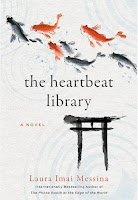On being alone: “What big plans we had. How many more adventures there would be for us…” AND “Now I wrestle the wheelie bag over the rough ground by myself. I let sadness come and accept it. This is how it is now. Lonely.”
On family and marriage: “This wobbly trio. It was how we would have to go on. We would have to learn to balance ourselves in an unfamiliar asymmetry. And we would all have to learn to stop setting the table for four.” AND “In 35 years Tony and I had settled into an amicable division of labor within the marriage, taking responsibility for the tasks for which each of us had aptitude.” She wisely recommends, “Jot down all the tasks you don't bother to mention that keep the household afloat, the set of torches that only you have learned to juggle. All the little things your partner didn't expect to need to know, until the day they never expected to happen.”
On how hard it is to find space and time to grieve: “… a cascade of consequences. My credit cards froze, because Tony was the primary card holder. In my gray mist of sadness, I did not want to think about credit cards, but I had to, since our bills were paid that way, and if I didn't immediately get to work on making other arrangements, we mightn’t have lights or phones the following month. I knew I was lucky to have the wherewithal to pay those bills. For so many the death of a spouse is also the death of the breadwinner.” AND “I was used to seeing my desk covered with notes for my fiction, not legal documents, financial spreadsheets, and baskets of condolence notes.” AND “I haven't cried like that for Tony. … I was afraid to give way to it. I knew that if I started, I mightn't be able to stop. So I shut it down. And for the past two years, I haven’t been able to cry at all.”
On advice from friends: “Do your work. It might not be your best work, but it will be good work, and it will be what saves you.” AND, from a widower friend: “The first time he had ventured out after losing his beloved wife, Gretchen, no one had mentioned her, and he had been hurt and angered. He realized that he needed to speak of her first, to allow others to do so.”
In conclusion: “I do know this: my job is to carry his light. To keep him vibrantly illuminated for my sons, and for their children -- his grandchildren -- when they get here.”
MEMORIAL DAYS received starred reviews from both Booklist and Publishers Weekly. Related titles to pursue include Year of Magical Thinking by Didion and Crying in H Mart by Zauner. Brooks also mentions The Light of the World by Elizabeth Alxander and A Widow’s Story by Joyce Carol Oates.
Personally, I want to highly recommend the “Daily Meditations For Working Through Grief” contained in Healing Through Loss by Martha Whitmore Hickman, providing much needed solace to millions since it as originally published in 1994. Some recent non-fiction texts which I have been slowly exploring and hope to review shortly include Can Anyone Tell Me? by Meghan Riordan Jarvis; My Last Gift by Kim Boyer; Renegade Grief by Carla Fernandez; and What Your Body Knows About Happiness by Janice Kaplan.
Brooks alludes to the comfort from music. Here is Coldplay and Dick Van Dyke with All My Love:









